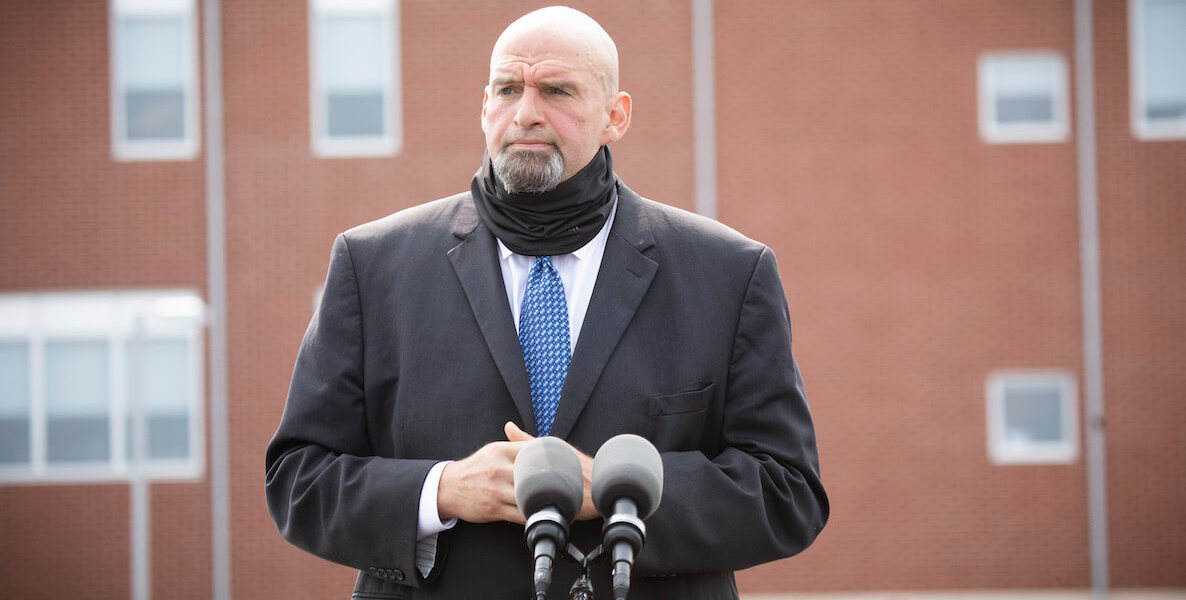John Fetterman was elected in November 2022 to represent Pennsylvania in the U.S. Senate. The Democrat previously served as lieutenant governor of PA and mayor of Braddock, PA.
The Philadelphia Citizen has covered Fetterman often over the years. He’s joined us for events — both IRL and virtual — and sat down for interviews with our co-executive director Larry Platt.
Here are some of the things things we’ve learned and you should know — both fun and serious — about the York, PA, native and former offensive tackle at Albright College.
1. HE’S FOCUSED ON COMMUNITY CULTIVATION
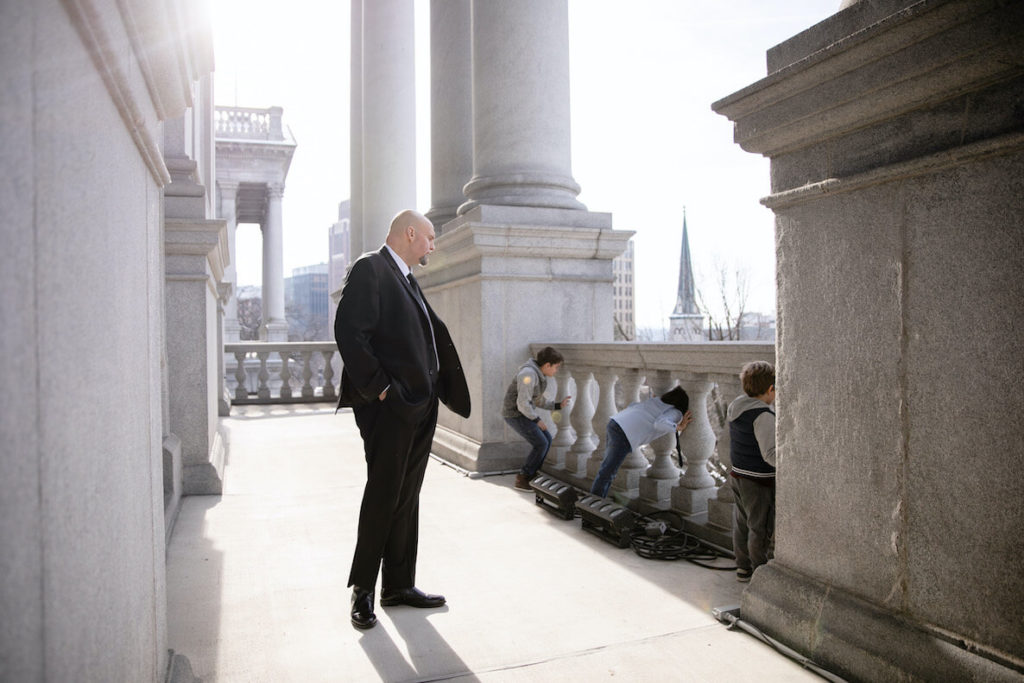
Fetterman, a lifelong Pennsylvanian, was born to teenage parents in Reading, and grew up in York. Early on he worked for his family’s insurance business, but eventually left for an AmeriCorps project that landed him in Pittsburgh in the late 1990s.
After two years at Harvard Kennedy School, where he studied education and social policy, he was hired to return to the Pittsburgh area to build a program for at-risk youth in Braddock. He settled in by using family money to save a church from demolition, later turning it into the only community center in town. He then bought a moribund warehouse that he transformed into a loft to live in.
Four years later, at age 36, he ran for mayor, a part-time position with a monthly stipend of a little over $100, winning against the incumbent by just a single vote. When he ran for reelection in 2009, he won by a 2-1 margin — and again in 2013, completely unchallenged.
2. FETTERMAN WORKED TO BEAUTIFY BRADDOCK, PA
While he was mayor, Fetterman founded Braddock Redux, a nonprofit to preserve town buildings with the hope that if people returned to Braddock, there would be something to return to. Beyond that, Fetterman began developing new things for Braddock that had not been seen in decades: city green spaces, housing programs, urban gardens and a new community center.
Focusing a significant amount of physical space, financial resources and time to build a vibrant arts program and community enhanced the inherent beauty that Fetterman says he has always seen in Braddock.
3. HE HELPED AMPLIFY THE ARTS IN BRADDOCK
At UnSmoke Systems, an initiative of Braddock Redux, a gallery and events space was refashioned out of the auditorium and former classrooms of an old Catholic school that served as artists’ studios, attracting artists from the area and beyond to work and show their work through collaborations.
Fetterman’s main motivation for the arts program, however, was to serve Braddock’s youth through a yearly, highly-attended district art show, the Braddock Youth Project, which helped build the quirky “Welcome to Historic Braddock” mosaic sign that still stands at the town’s entrance.
4. HE HIT THE GROUND RUNNING TO FIGHT POVERTY
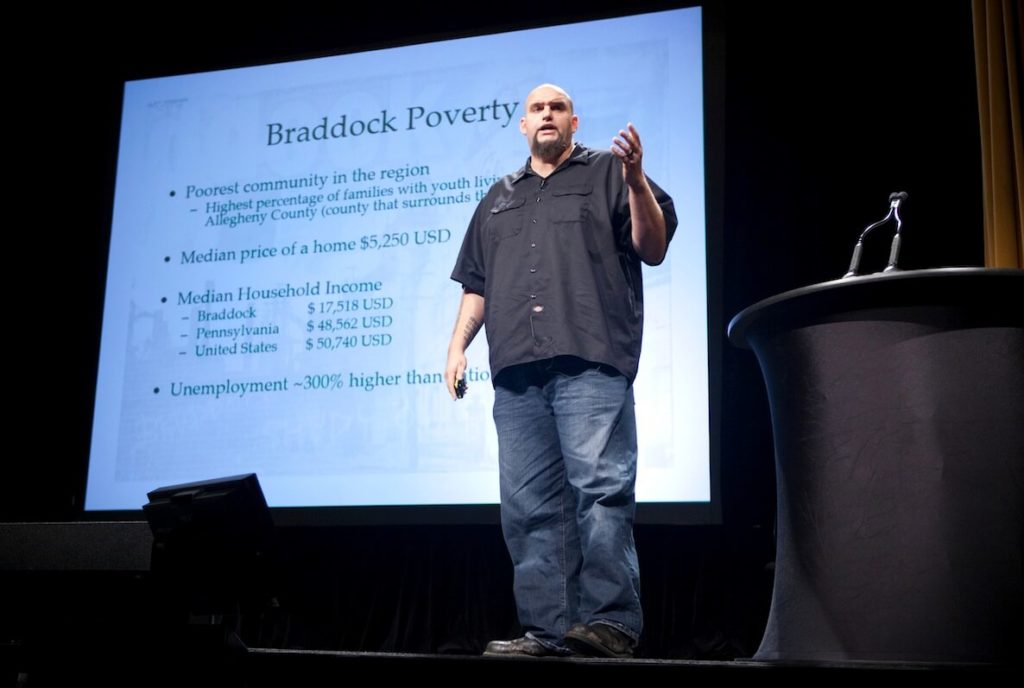
Fetterman worked to address Braddock’s poverty problem by partnering with organizations and businesses to deliver food to the city’s neediest, which often meant Fetterman driving the trucks himself.
By negotiating with utility companies, he worked to make sure water, gas and electricity stay on in homes where bill payment was delinquent, especially in extreme weather months. And he even bought houses to keep them from going into foreclosure, while keeping residents in them at low-or-no cost.
5. HE ROCKS SOME PRETTY COOL TATTOOS ON HIS ARMS
If you’ve seen his ads, you’ve likely watched him show them off. One tattoo is the zip code of Braddock, PA, where he served as mayor from 2005 to 2019. The other arm has a list of dates of murders that occurred in Braddock. The ink matches his 6’8”-foot frame, shaved head and bristly beard. That, with his preferred uniform of work shirts and cargo shorts, makes him look more like a bar bouncer than a mayor. This is all probably much of the reason why The Guardian decided to dub him “America’s coolest mayor.”
6. HE DOESN’T LIKE TO BE CALLED A “POLITICIAN”
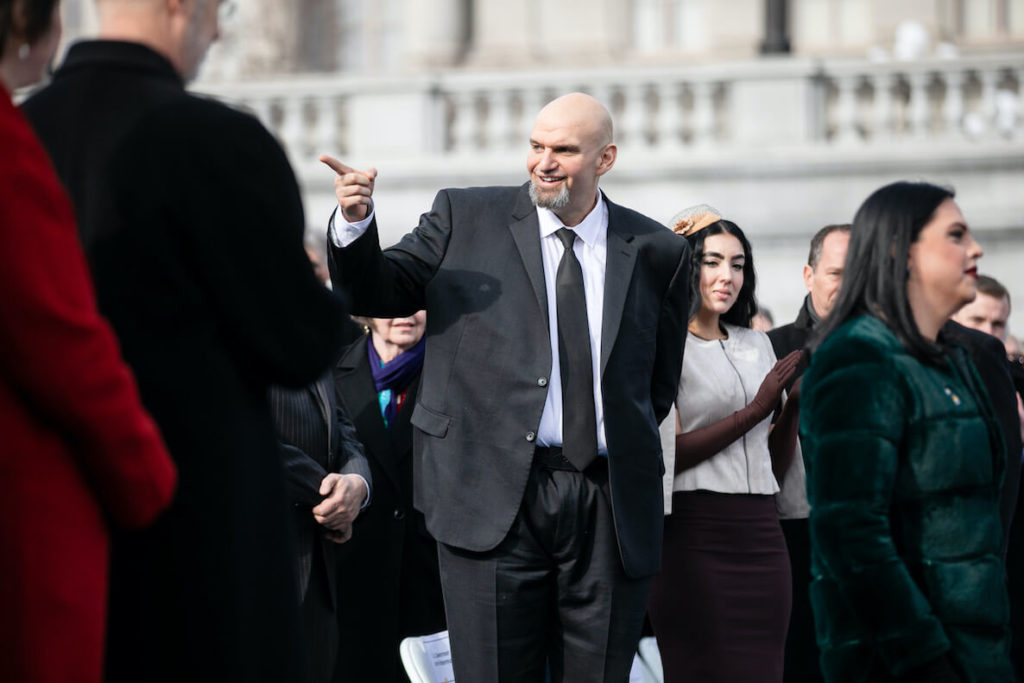
At an event in 2016, he told us that he considers himself “a social worker who holds a public office.”
7. JOHN FETTERMAN LOST A RUN FOR SENATE IN 2016
His primary campaign at the time garnered 20 percent of the vote, an impressive showing for someone who only raised roughly $600,000. That, he said, came mostly from small-dollar donations.
8. FUNDRAISING IN POLITICS MAKES HIM FEEL “SOULLESS”
“The tyranny of big dollar fundraising,” he told us in 2016, “has taken us away from the principal of one man, one vote. It gets us away from equality. If you can give me $25,000, you’re more important than someone who can give me $25. It shouldn’t be that way …
Because it really is about a system. I want to be clear: I hate the game, not the players. It’s a bad system … The Internet can free us from that perverse Citizens United ruling that equates money with speech, which has led us to this point where just a handful of wealthy families are underwriting our politics. That’s a dangerous proposition.”
9. HIS SOLUTION TO DIALING-FOR-DOLLARS FUNDRAISING?
“The only thing I can think of is online,” he told Larry Platt in 2016. “I’d much rather have 100 $25 donations than one $2,500 contribution. That’s more the essence of democracy. I’m a big believer in crowdfunding — why not crowdfund campaigns? … When things aren’t working the way they should, it’s usually about the money … Gun control? Despite 90 percent of Americans agreeing with common sense regulations, lobbyists work a broken system. Well, our politics are broken, too. And that’s also about the money.”
In just the first two weeks of his announcement that he was exploring a run for Senate, Fetterman raised over 1 million dollars. His office reported that 99 percent of the 33,000 contributions were small-dollar amounts under $200, with an average of $33. Donations came in from all 50 states, and all 67 counties in Pennsylvania.
10. HE DOES ENJOY BEING A CANDIDATE FOR OFFICE
“I love everything about it, other than the fundraising. I love going to events, meeting voters, debating ideas, helping to solve problems in real people’s lives.”
11. HE CHAMPIONS INNOVATION IN GOVERNMENT
Fetterman joined The Citizen at an event in 2016 at the Barnes Foundation in which he sat down with two other young mayors, Rochester’s Lovely Warren and South Orange’s Alex Torpey, to discuss what real politics is (or should be) about: thinking, innovating and reinventing communities to make every resident successful. See more of the discussion in the video above.
12. HIS STANCE ON LEGALIZING MARIJUANA IS 👍
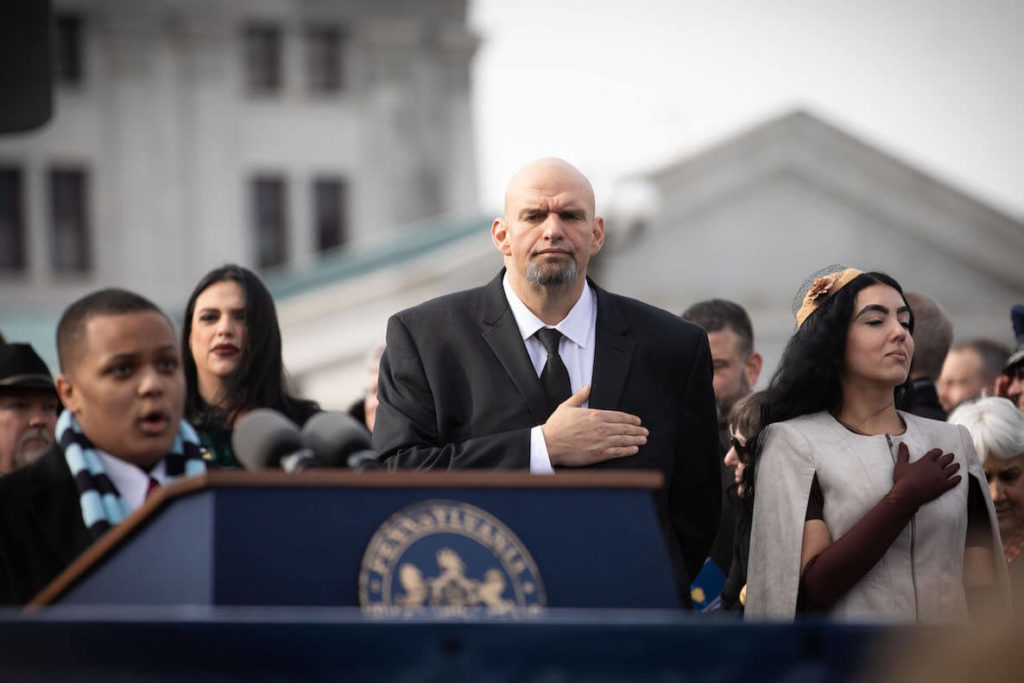
Fetterman is so supportive of the legalization of weed that he went on a whole listening tour in 2019 to talk to voters about it — though this writer contends that there were more pressing issues to crisscross the state for. Fetterman has even gone so far as to say in a debate in 2018 that he thinks Pennsylvania should go “full Colorado.” Fetterman told us at an event in 2020 that he doesn’t partake in weed himself, but his wife, Gisele Fetterman (pictured above, right of Fetterman), is an outspoken user of medical marijuana,
13. HE’S NOT AFRAID TO REACH ACROSS THE AISLE
John Fetterman became fast friends with Jeff Bartos, the Republican who challenged him in his run for lieutenant governor in 2018. “In short order,” writes Citizen co-Executive Director Larry Platt, “they became a type of political odd couple, their close relationship a testament to the quaint idea that, in politics, you can disagree without being disagreeable, and that, when you know a rival — really know them — it enhances the likelihood of finding common ground.”
14. BIPARTISANSHIP IN HIS OWN WORDS?
“It would change everything,” he says. “You put [Republican Jeff Bartos] and I in a room and we can figure out so much together. We know each other and we trust each other. The idea of binary politics is just silly. If you’re for X, you’re evil, and if you’re for Y, you’re pure. It’s the death of nuance. Put me and Jeff in the room and we’ll find common ground and solve problems.”
At a virtual event in 2020, he added that, “You can feel strongly about an issue, you can agree to disagree, but you can still be friends, you can still have a beer, and you can still work to a better outcome for everybody. And I would never want to lose sight of that.”
16. HE’S UNAFRAID TO TROLL HIS OPPONENT
Bipartisanship talk aside, Fetterman’s campaign took square aim at Republican Mehmet Oz, for not so much for Oz’s politics or his Trump affiliation, as for his wealth, longtime North Jersey residency, TV celebrity and the disproved (and often sponsored) remedies Oz promoted on his show.
Some criticized Fetterman’s tactics, which appeared not just on social media and TV (Snooki and Steven Van Zandt appeared in commercials), but also on a plane banner flying along the shore that read, “HEY DR. OZ, WELCOME HOME TO NJ! ♥ JOHN.”
16. HE REALLY DID CHASE AN UNARMED BLACK JOGGER
From PolitiFact:
In January 2013, while mayor of Braddock, Fetterman said he thought he heard a dozen gunshots near his home and called 911 … Fetterman chased Chris Miyares, who is Black, and displayed a shotgun to detain him until police arrived. Police said Miyares was wearing headphones and exercise clothes. They said he did not have a weapon and released him without filing any charges.
Naturally, Oz launched a $500,000 ad campaign to highlight this.
17. HE HAD A STROKE THAT CAUSED MORE CONTROVERSY
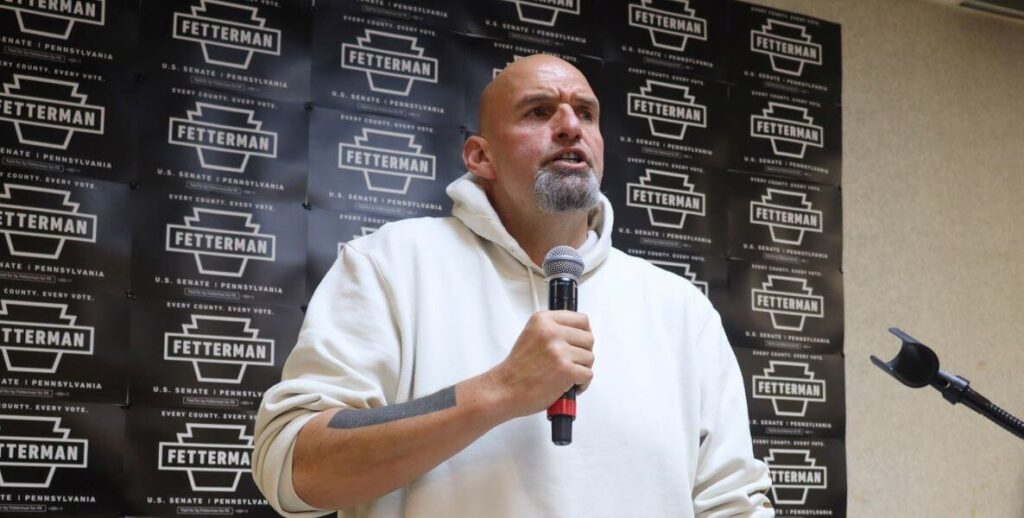
Just before the May 2022 primary election, Fetterman had a stroke that took him out of commission for two months. His campaign was initially slow to disclose both the fact and the severity of the stroke. Fetterman made his first public, post-stroke speech in August and has since been exhibiting occasional verbal missteps, a result of stroke-induced auditory processing disorder.
Here again, he became the object of both criticism — for his campaign’s caginess about his health — and worry: If elected, would he be healthy enough to perform his duties? In September, he gave a 40-minute video interview to the New York Times to discuss his health and recovery.
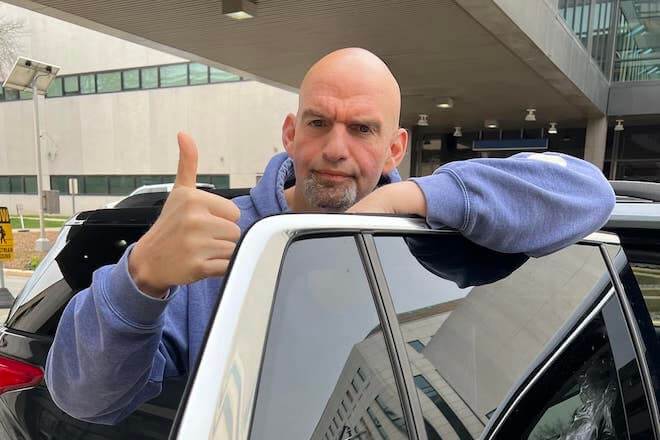
18. HE’S BEING TREATED FOR DEPRESSION
Six weeks after his swearing-in for the Senate, Fetterman took the advice of Congress’ attending physician — and entered Walter Reed National Military Medical Center for treatment for clinical depression. This time, the freshman Senator was open about his diagnosis.
He’d been unable to get out of bed, losing weight. Despite having won the very visible race for his seat in the Senate, he told CBS This Morning, he felt the opposite. “Depression can absolutely convince you that you actually lost.” Fetterman received inpatient care for six weeks, receiving daily updates from work, and announced plans to return to Congress in mid-April.
Reporting provided by Allan McDuffee, Josh Middleton, Lauren McCutcheon, Larry Platt and Roxanne Patel Shepelavy
Photo courtesy Governor Tom Wolf / Flickr

